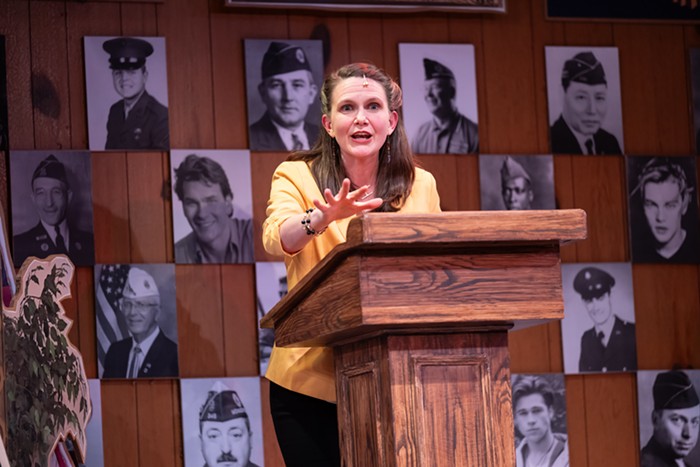at the Magdelyn Theater, 403 NW 5th, 274-4771, Fri-Sat 7:30 pm, Sun 2:30 pm, through Nov 28, $15
Recently, in a conversation on favorite thrillers, a friend mentioned Fred Walton's When A Stranger Calls, an obscure 1979 stalker flick starring Charles Durning and Carol Kane. I found this odd because I had just learned of that film a week earlier, via a press release from the NW Classical Theatre Company on their upcoming production of Julius Caesar, which is, interestingly, directed by that same filmmaker, Mr. Walton. Without this odd coincidence, I would not have attended NWCTC's Caesar as I'm tired of this overrated, middling history play that peaks early, then drags to a limp finish.
Yet, serendipity called, so I went, and what I saw was what I always see at a Caesar production: Brutus and Cassius stand around plotting Caesar's murder for what feels like hours, then some killing commences and things get momentarily exciting, then Caesar's good buddy Antony gives one of the great speeches in dramatic history ("Friends, Romans, Countrymen," yadda yadda), which is so good the ensuing battle between much less interesting characters--which again seems to take hours--feels like leftovers. With his cinematic pistons pumping, Walton delivers a stripped-down, 90-minute production of all this--which could have been exciting since the text is punctuated by so many cut-worthy duds, but is canceled out by not one, but TWO 10-minute intermissions. For a short play, that's two intermissions too many.
NWCTC is an odd little company. Their productions invariably feature good energy, talented actors, and production values on the scale of a church basement. The Magdelyn Theater space has a cardboard-looking stage and lights that are perhaps a small step above fluorescents. Walton stuffs a massive cast into this oversized coffin, which gives the play's many street/crowd scenes a bustling urgency. The production climaxes, as it should, with Antony's funeral speech, delivered with rousing passion by Grant Turner and accentuated by the jostling throng's boisterous excitement. It's a great scene, emphasized by the quieter, less-populated moments in which Walton's staging heads south, the people move aside, and the audience is no longer distracted from the truly ugly walls 'tween which this production resides.


















